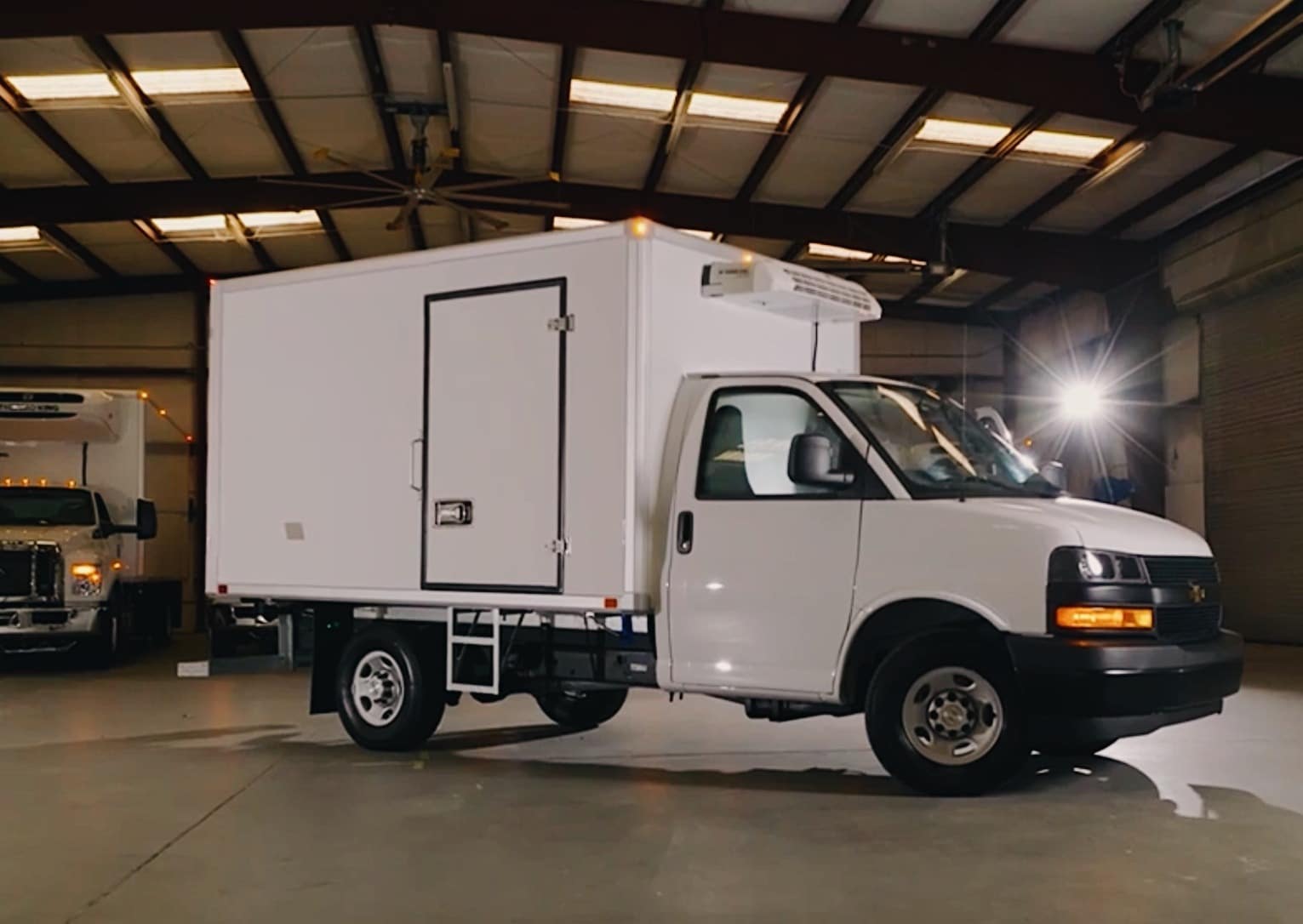Reefer Trucks Thermo King: Relied On for Temperature-Sensitive Item
Reefer Trucks Thermo King: Relied On for Temperature-Sensitive Item
Blog Article
Leading Innovations in Transport Refrigeration: Enhancing Efficiency and Security
The landscape of transport refrigeration is going through substantial transformation, driven by developments aimed at improving both effectiveness and safety and security. As these technologies continue to evolve, it is essential to explore their effects on operational methods and governing conformity, triggering a more detailed assessment of exactly how they reshape the future of transportation refrigeration.
Smart Temperature Keeping An Eye On Systems
In the world of transportation refrigeration, clever temperature level tracking systems have arised as a crucial innovation for making sure the integrity of temperature-sensitive items. These advanced systems utilize Internet of Things (IoT) modern technology to give real-time data on temperature variations, allowing operators to preserve ideal conditions throughout the supply chain. By continuously tracking the temperature level of chilled containers and cars, business can quickly recognize variances that may jeopardize product quality.

Moreover, wise surveillance systems typically include automated notifies and notifications, enabling stakeholders to respond without delay to any kind of potential issues. This positive method not only minimizes the risk of wasting yet likewise enhances conformity with regulatory requirements governing food security and pharmaceutical transport.
The integration of information analytics within these systems likewise facilitates anticipating maintenance, aiding operators to foresee possible tools failings before they happen. This capacity reduces downtime and enhances functional performance, ultimately leading to cost savings.
Eco-Friendly Refrigerants
Smart temperature level monitoring systems play an essential function in maintaining item quality, yet the effectiveness of transport refrigeration additionally depends upon the selection of cooling agents used. As ecological concerns increase, the shift towards eco-friendly cooling agents has actually come to be essential. Typical cooling agents, such as hydrofluorocarbons (HFCs), are well-known for their high Global Warming Prospective (GWP), contributing considerably to environment change. On the other hand, arising options like hydrocarbon-based cooling agents and hydrofluoroolefins (HFOs) present lower GWP options, supplying both performance and sustainability.
These green refrigerants not just minimize environmental effect but also align with worldwide guidelines targeted at eliminating unsafe compounds. Their adoption can cause boosted energy efficiency, inevitably decreasing operating expense for transport refrigeration systems. The use of all-natural cooling agents, such as ammonia and carbon dioxide, has actually acquired traction due to their outstanding thermodynamic buildings and reduced ecological impact.
Investing in eco-friendly refrigerants is not just a regulatory conformity action; it represents a critical decision that improves brand track record and promotes customer commitment. refrigerated transportation thermo king. By prioritizing lasting practices, companies can add to a greener future while making sure the stability of delivered products
Advanced Insulation Products
Making use of advanced insulation materials is important for optimizing transportation refrigeration systems, as they considerably boost power effectiveness and maintain regular temperature control. Typical insulation approaches commonly fall brief in stopping thermal transfer, leading to boosted power consumption and varying temperatures within chilled areas.
Emerging products such as vacuum cleaner shielded panels (VIPs) and aerogels offer premium thermal resistance, allowing for thinner profiles without jeopardizing performance. VIPs, for circumstances, make use of a vacuum layer to reduce convective and conductive heat transfer, making them excellent for space-constrained applications. Aerogels, understood for their porous and light-weight structure, supply extraordinary insulation while considerably reducing total system weight.
Moreover, including phase change products (PCMs) right into insulation systems can additionally stabilize temperature levels throughout transportation. These products absorb and release thermal power, properly buffering against exterior temperature level variants.
The integration of these sophisticated insulation materials not only decreases the functional costs connected with energy usage but also expands the service life of temperature-sensitive products. As wikipedia reference the transport refrigeration market remains to progress, the fostering of ingenious insulation technologies will certainly be pivotal in boosting both performance and safety in refrigerated transportation.
Automated Course Optimization
The effectiveness of transportation refrigeration systems is significantly improved through automated path optimization, which leverages real-time information and sophisticated formulas to determine one of the most efficient paths for distribution. By analyzing different elements such as web traffic patterns, climate condition, and delivery home windows, these systems can significantly decrease travel time and fuel intake.
Automated course optimization minimizes human error and subjective decision-making, which can bring about inadequacies. This innovation enables fleet supervisors to allocate resources better, making sure that chilled goods keep their required temperature throughout the trip. By optimizing paths, firms can additionally enhance customer fulfillment with prompt deliveries.
In addition, automated systems can adapt to unanticipated situations, such as road closures or unexpected web traffic spikes, allowing for dynamic rerouting. This versatility not just shields the integrity of temperature-sensitive items yet additionally contributes to overall operational effectiveness.
Implementing automated path optimization can lead to substantial price financial savings while lowering the carbon impact related to transport. As services increasingly prioritize sustainability, this innovation stands apart as an important element in modern-day transport refrigeration, straightening operational goals with environmental duty. Eventually, automated course optimization represents a considerable improvement in the pursuit for performance and safety and security in transportation refrigeration.

Real-Time Information Analytics
Automated path optimization dramatically take advantage of the assimilation of real-time information analytics, which offers important understandings into the performance of transport refrigeration systems. By making use of real-time data, transport operators can keep track of temperature level fluctuations try this web-site and tools performance, ensuring that subject to spoiling products are maintained within called for criteria throughout transit. This positive method not only improves the quality of the moved products yet also reduces the threat of perishing and loss.

Along with enhancing performance, real-time analytics improves safety by ensuring compliance with governing standards for temperature control. This not just secures public health yet also strengthens a company's track record - thermo king transport refrigeration. As the transport refrigeration sector progresses, the combination of real-time information analytics emerges as a keystone for driving innovation, sustainability, and operational quality
Final Thought
Finally, the advancements in transportation refrigeration dramatically enhance both performance and safety and security within the market. Smart temperature tracking systems and real-time data analytics supply important oversight, while green refrigerants and progressed insulation products contribute to sustainability and power effectiveness. Automated route optimization algorithms not just lower traveling time however also reduce ecological impact. Collectively, these developments stand for an essential development in transport refrigeration, making certain compliance with regulative standards and advertising a greener future.
The landscape of transport refrigeration is undergoing considerable improvement, driven by advancements intended at enhancing both performance and security.Smart temperature level monitoring systems play an essential function in keeping description item quality, but the effectiveness of transport refrigeration also pivots on the option of refrigerants made use of. Their fostering can lead to improved power performance, eventually decreasing operating expenses for transport refrigeration systems. Ultimately, automated route optimization represents a substantial innovation in the mission for performance and safety and security in transportation refrigeration.
In verdict, the developments in transportation refrigeration considerably enhance both effectiveness and safety within the market.
Report this page